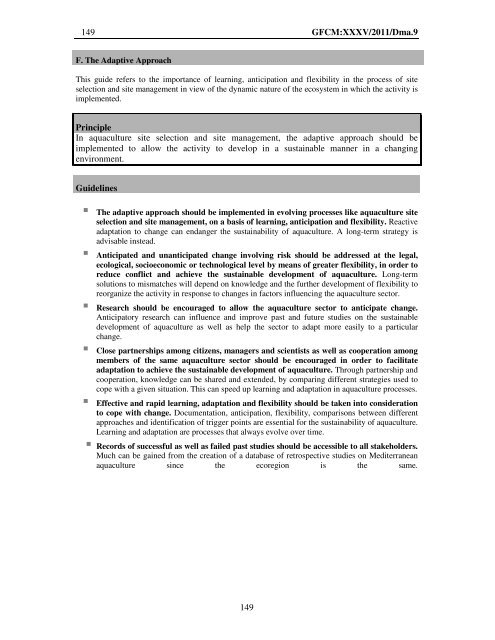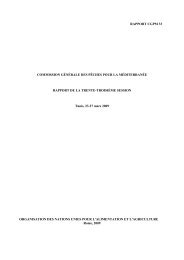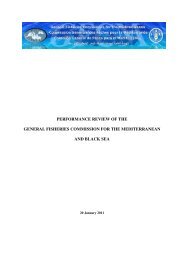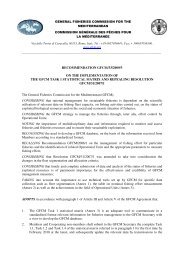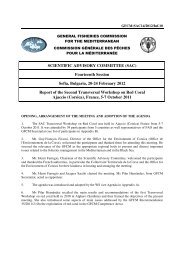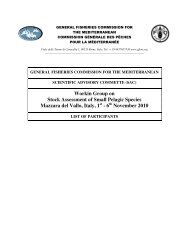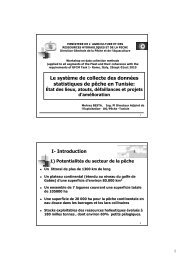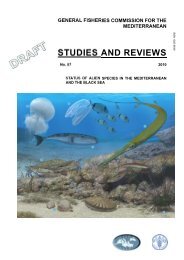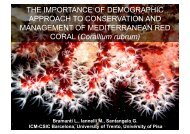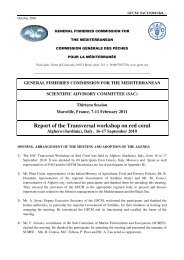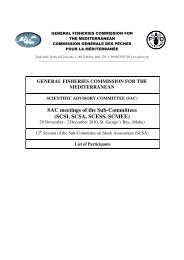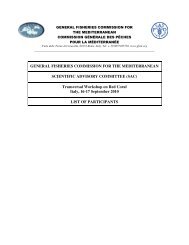Site selection and carrying capacity in Mediterranean ... - FAO Sipam
Site selection and carrying capacity in Mediterranean ... - FAO Sipam
Site selection and carrying capacity in Mediterranean ... - FAO Sipam
You also want an ePaper? Increase the reach of your titles
YUMPU automatically turns print PDFs into web optimized ePapers that Google loves.
149 GFCM:XXXV/2011/Dma.9<br />
F. The Adaptive Approach<br />
This guide refers to the importance of learn<strong>in</strong>g, anticipation <strong>and</strong> flexibility <strong>in</strong> the process of site<br />
<strong>selection</strong> <strong>and</strong> site management <strong>in</strong> view of the dynamic nature of the ecosystem <strong>in</strong> which the activity is<br />
implemented.<br />
Pr<strong>in</strong>ciple<br />
In aquaculture site <strong>selection</strong> <strong>and</strong> site management, the adaptive approach should be<br />
implemented to allow the activity to develop <strong>in</strong> a susta<strong>in</strong>able manner <strong>in</strong> a chang<strong>in</strong>g<br />
environment.<br />
Guidel<strong>in</strong>es<br />
The adaptive approach should be implemented <strong>in</strong> evolv<strong>in</strong>g processes like aquaculture site<br />
<strong>selection</strong> <strong>and</strong> site management, on a basis of learn<strong>in</strong>g, anticipation <strong>and</strong> flexibility. Reactive<br />
adaptation to change can endanger the susta<strong>in</strong>ability of aquaculture. A long-term strategy is<br />
advisable <strong>in</strong>stead.<br />
Anticipated <strong>and</strong> unanticipated change <strong>in</strong>volv<strong>in</strong>g risk should be addressed at the legal,<br />
ecological, socioeconomic or technological level by means of greater flexibility, <strong>in</strong> order to<br />
reduce conflict <strong>and</strong> achieve the susta<strong>in</strong>able development of aquaculture. Long-term<br />
solutions to mismatches will depend on knowledge <strong>and</strong> the further development of flexibility to<br />
reorganize the activity <strong>in</strong> response to changes <strong>in</strong> factors <strong>in</strong>fluenc<strong>in</strong>g the aquaculture sector.<br />
Research should be encouraged to allow the aquaculture sector to anticipate change.<br />
Anticipatory research can <strong>in</strong>fluence <strong>and</strong> improve past <strong>and</strong> future studies on the susta<strong>in</strong>able<br />
development of aquaculture as well as help the sector to adapt more easily to a particular<br />
change.<br />
Close partnerships among citizens, managers <strong>and</strong> scientists as well as cooperation among<br />
members of the same aquaculture sector should be encouraged <strong>in</strong> order to facilitate<br />
adaptation to achieve the susta<strong>in</strong>able development of aquaculture. Through partnership <strong>and</strong><br />
cooperation, knowledge can be shared <strong>and</strong> extended, by compar<strong>in</strong>g different strategies used to<br />
cope with a given situation. This can speed up learn<strong>in</strong>g <strong>and</strong> adaptation <strong>in</strong> aquaculture processes.<br />
Effective <strong>and</strong> rapid learn<strong>in</strong>g, adaptation <strong>and</strong> flexibility should be taken <strong>in</strong>to consideration<br />
to cope with change. Documentation, anticipation, flexibility, comparisons between different<br />
approaches <strong>and</strong> identification of trigger po<strong>in</strong>ts are essential for the susta<strong>in</strong>ability of aquaculture.<br />
Learn<strong>in</strong>g <strong>and</strong> adaptation are processes that always evolve over time.<br />
Records of successful as well as failed past studies should be accessible to all stakeholders.<br />
Much can be ga<strong>in</strong>ed from the creation of a database of retrospective studies on <strong>Mediterranean</strong><br />
aquaculture s<strong>in</strong>ce the ecoregion is the same.<br />
149


